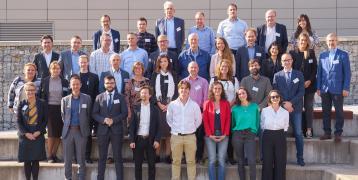Innovation Inducement Prizes: small steps to transformative changes

There is a growing consensus that innovation policies need to be directed toward addressing societal challenges like climate change, pollution, biodiversity loss, health risks, or inequality. Read more on this topic in our policy brief on open, social, and responsible innovation.
To achieve this, regional policymakers are being encouraged to adopt novel innovation policy paradigms such as transformative innovation policies, challenge-oriented innovation policies, or mission-oriented innovation policies. This shift requires policymakers to develop new administrative capacities, engage with reflexive governance arrangements, coordinate policies across regional policy silos, and implement integrated policy mixes to solve complex problems (Schot & Steinmüller).
However, the concept of small wins provides a promising approach for policymakers to engage in these new policy paradigms. Small wins involve small-scale and bottom-up initiatives guided by a shared agenda to address societal challenges (Bours et al.). Instead of bold and radical changes, small wins emphasize that small, consecutive actions can accumulate and lead to transformative changes.
Small wins strategies
Policy makers can introduce innovation inducement prizes with a challenge-oriented approach to solve regional societal challenges. Challenge-oriented regional prizes (CORP) is a type of contest used by public sponsors to break down a complex societal challenge into manageable and coherent regional challenges that can be regionally addressed with place-based solutions (see Morisson et al.).
CORPs must be carefully designed to identify regional challenges, attract competent solvers, and answer questions regarding co-sponsors, participant eligibility, competition rules, intellectual property rights, awards and criteria, and public engagement. As such, CORPs can be seen as a small-wins strategy for regions to start engaging in transformative innovation policies and build institutional and governance capacities to experiment with more systemic approaches to solve place-based societal challenges.
Interreg Europe projects, such as INNOBRIDGE, SCALE UP, or URBAN M are testing the use of inducement prizes with a challenge-oriented approach.
Hackathons for urban challenges in Sofia
The Sofia Development Association was created by the Municipality of Sofia, Bulgaria, to promote quadruple helix engagement and to pilot and test innovative solutions. The Association has organised more than 20 hackathons to solve place-based urban challenges.
Hackathons are short-term competitions where teams compete to develop minimum viable products (MVP) before presenting them to a jury. The winners receive a prize money to further develop their MVP and prototypes.
The Sofia Development Association is involved to frame the challenges, to find funding for the prize money thanks to co-sponsorship, to assist prototype development, and to support further public procurement or commercialisation.
Building on the experiences of Interreg Europe partners, such as the good practices from Castilla y Léon, Spain:
the partner in Sofia introduced changes to its hackathons to provide an interregional dimension and an emphasis on S3 priorities (INNOBRIDGE project).
In November of 2022, a hackathon focused on ‘InnoAirChallenge: just green transition and urban mobility’. This event was organised with funding from Urban Innovative Actions. The purpose of the hackathon was to develop digital solutions for urban mobility with the goal of tackling air pollution in Sofia.
Open innovation challenges in Lazio
Open innovation challenges can strengthen interactions within regional innovation ecosystems. The regional innovation agency Lazio Innova, Italy, introduced the Open Innovation Challenge to support the regional entrepreneurial ecosystem. It connects entrepreneurs and startups with challenges presented by large private companies. Lazio Innova facilitates the process and provides mentorship opportunities to help solvers develop and adapt their solutions to meet the needs of private companies.
At the end of the challenge, Lazio Innova hosts a final event to recognize the best solutions with monetary prizes and consultancy services. After 9 Challenges organised, 7 commercial agreements were signed between large corporates and start-ups. This good practice has been transferred in North-Hessen, Germany (SCALE UP project).
Fostering an entrepreneurial mindset in San Sebastiàn
Inducement prizes can foster an innovation and entrepreneurial mindset among students. The Donostia Innovation Campus is a programme to diffuse an innovation culture to the youth in San Sebastián, Spain. The programme is meant to ensure close collaboration between educational institutions and the business sector to find practical solutions and prototypes to challenges proposed by the business sector. It comprises three main action lines:
- Dissemination and information activities, such as school visits to innovative companies
- The Donostia Innovation Challenge, a competition for students to provide technological solutions to urban and business challenges
- Co-financing of innovation events
The main objective of the initiative is to cultivate a positive attitude towards entrepreneurship and technological and scientific activities among young people (more information on URBAN M). After more than 50 thematic sessions, 100% of the involved teachers agreed that the programme has helped students to train and develop new skills.





